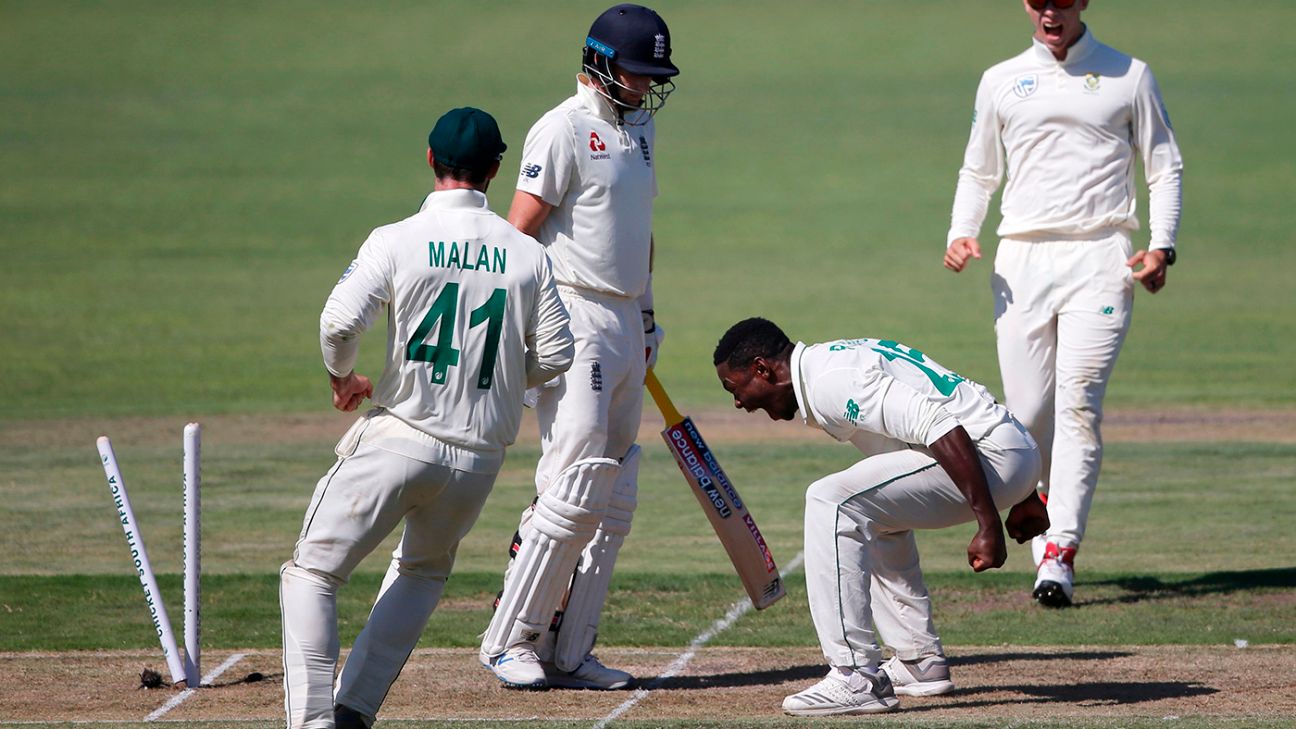Kagiso Rabada‘s aggressive wicket-taking celebrations could be a result of being overburdened, according to Graeme Smith, South Africa’s acting director of cricket.
Rabada, who has 43 Test caps to his name at the age of 24, accumulated a fourth active demerit point when he entered Joe Root’s personal space and screamed at the ground where Root was standing, after dismissing him at St George’s Park. As a result, Rabada will miss a must-win Test for South Africa at the Wanderers. While being careful not to excuse Rabada’s behaviour, Smith called on other players to step up and share the load.
“It can’t happen anymore. He is disappointed,” Smith said. “There is an element of consistency from the ICC we need to get and understand but we cannot have our gun bowler missing games for these type of things anymore.
“He is a poster boy and we need to develop more poster boys. Too much has been put on his shoulders as well. He is on every ad, playing every game, he is carrying the can. If he doesn’t perform well, we are in trouble. I think it’s a good thing he is being rested in this series, we need to see some other people step up and start filling that void and taking some pressure off him. Maybe that will help as well.”
This is not the first time Rabada has been sanctioned for breaching the ICC’s code of conduct. In July 2017, he missed the second Test against England at Trent Bridge after again racking up demerit points which culminated in a send-off for Ben Stokes at Lord’s. South Africa won the match despite Rabada’s absence.
Rabada was also in danger of being suspended from the Cape Town Test against Australia in 2018 after he violated the code of conduct twice in Port Elizabeth, first when he yelled into David Warner’s face and then when he had a shoulder brush with Steve Smith. The second offence was initially deemed a Level 2 sanction but on appeal, Rabada was successful in downgrading it to a Level 1 offence and he escaped a ban.
On that occasion, Rabada admitted he was letting the team down. Now, two years later, he has said almost exactly the same thing, leading to questions about why he has not learnt from his mistakes. Smith believes it could be the expectation that falls on Rabada as leader of the attack, particularly when South Africa are not performing.
At St George’s Park, Vernon Philander and Dane Paterson were ineffective with the new ball, leaving it to Rabada to make the breakthrough with Root’s wicket. While dismissing the opposition captain was something to celebrate, Smith believes Rabada needs to learn how to direct his excitement elsewhere.
“It’s learning how to channel that emotion in the moment, when your adrenaline is pumping and you have put in the hard work,” Smith said. “How does he channel that better? How does he become a charismatic man for the environment and the crowd without transgressing? These are things that hopefully we will be able to guide him but also in those moments on the field, with that instinct, how he responds is important.
ALSO READ: Smith seeks clarity on du Plessis’ international future
“Sometimes you do get hot-headed, we have all been there, on the field, when your emotions are running high, you’re in the moment, it’s a battle between you and the top batter, and vice-versa, and that’s got to come now. He is experienced enough to know how to channel that and that’s what we’ve got to get out of him.”
That Rabada has been able to become so experienced in such a short period of time is also the result of South Africa’s transformation targets, which require the national team to field a minimum of six players of colour including two black Africans on average over the course of a season. And while there have been several black African players in the mix – Lungi Ngidi, Andile Phehlukwayo and Temba Bavuma – none of them have had the same consistent and injury-free run as Rabada, which has resulted in him being overused.
Earlier on Wednesday, Quinton de Kock said he while saw Rabada’s absence this week as a big loss for the team, it was also a much-needed opportunity for Rabada to “get some time off his feet”. Rabada will also be rested from the three-match one-day series which will give the opportunity to recharge the batteries and reflect on his conduct.
“In this period where he is going to have an extra week off and rest the one-day series – KG works extremely hard, he is extremely professional – we will be having discussions on channelling his emotions better and still being that aggressive fast bowler that South African cricket needs,” Smith said. “But he does need support from players around him and needs people to come through and carry some of that can so that he doesn’t always feel he is the ultimate guy that needs to deliver. We need to have more players around him. We need to get people like Lungi permanently on the field and fit and so on, carrying that can with him.”
Ngidi has been named in South Africa’s ODI squad but will only be available subject to passing a fitness test. He has not played any cricket since picking up a hamstring injury in the Mzansi Super League (MSL). He is involved in a three-week strength-and-conditioning camp along with Sisanda Magala, Tabraiz Shamsi and Jon-Jon Smuts, all of whom could play against England if they meet the required fitness standards. Rabada is expected to be back for the T20s.
